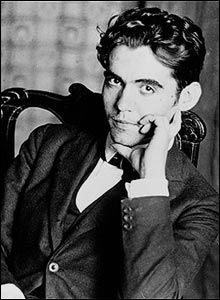to Jorge Zalamea
Dry land,
quiet land
of night’s
immensity.
(Wind in the olive groves.
wind in the Sierra.)
Ancient
land
of oil lamps
and grief.
Land
of deep cisterns.
Land of death without eyes
and arrows.
(Wind on the roads.
Breeze in the poplar groves.)
Village
Upon a barren hill,
a Calvary.
Clear water
and century-old olive trees.
In the narrow streets,
men hidden under cloaks,
and on the towers
the spinning vanes.
Forever
spinning.
Oh, village lost
in the Andalucia of tears!
Dagger
The dagger
enters the heart
the way plowshares turn over
the wasteland.
No.
Do not cut into me.
No.
Like a ray of sun,
the dagger
ignites terrible
hollows.
No.
Do not cut into me.
No.
Crossroads
East wind,
a street lamp
and a dagger
in the heart.
The street
quivers like
tightly pulled
string,
like a huge, buzzing
horsefly.
Everywhere,
I see a dagger
in the heart.
Ay!
The cry leaves shadows of cypress
upon the wind.
(Leave me here, in this field,
weeping.)
The whole world’s broken.
Only silence remains.
(Leave me here, in this field,
weeping.)
The darkened horizon’s
bitten by bonfires.
(I’ve told you already to leave me
here, in this field,
weeping.)
Surprise
He lay dead in the street
with a dagger in his chest.
Nobody knew who he was.
How the streep lamp flickered!
Mother of god,
how the street lamp
faintly flickered!
It was dawn. Nobody
could look up, wide-eyed,
into the glare.
And he lay dead in the street
with a dagger in his chest,
and nobody knew who he was.
Solea
Wearing black mantillas,
she thinks the world is tiny
and the heart immense.
Wearing black mantillas.
She thinks that tender sighs
and cries disappear
into currents of wind.
Wearing black mantillas.
The door was left open,
and at dawn the entire sky
emptied onto her balcony.
Ay, yayayayay,
wearing black mantillas!
Cave
From the cave
come endless sobbings.
(Purple
over red.)
The gypsy
calls forth the distance.
(Tall towers
and mysterious men.)
In an unsteady voice
his eyes wander.
(Black
over red.)
And the white-washed cave
trembles in gold.
(White
over red.)
Encounter
For you and I
aren’t ready
to find each other.
You…as you well know.
I loved her so much!
Follow the narrowest path.
I have
holes
in my hands
from the nails.
Can’t you see how
I’m bleeding to death?
Don’t look back,
go slowly,
and pray as I do
to San Cayetano
for you and I
aren’t ready
to find each other.
Dawn
Bells of Cordoba
in the early morning.
Bells of Granada
at dawn.
You are felt by all the girls
who weep to the tender,
weeping Solea.
The girls
of upper Andalucia,
and of lower.
You girls of Spain,
with tiny feet
and trembling skirts,
who’ve filled the crossroads
with crosses.
Oh, bells of Cordoba
in the early morning,
and, oh, bells of Granada
at dawn!
